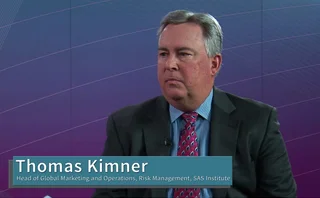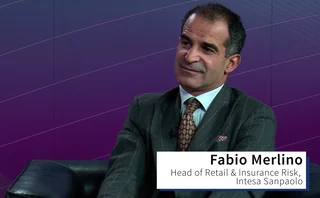
The top stories from RiskNews

Volumes up on trading platforms
Trading platforms have seen substantial increases in volumes since the start of the year. Average daily trading volumes at spot broker EBS have gone up to $125 billion so far this year, from $110 billion in 2004, the company said.
On its forex prime brokerage service, EBS Prime, average daily trading volumes were up between $5 billion and $6 billion, reflecting a 600% increase since the start of the year.
This includes additional trading volumes from hedge funds, fund managers and commodity trading advisers (CTAs), says Jack Jeffery, chief executive of EBS in London. “The presence of counterparties trading, or willing to trade, helps to create real liquidity and enhances the volume of activity we have been witnessing recently,” he says.
Hotspot FXi also reported a year-on-year volume rise of 165%, with hedge funds continuing to be the main players in this space. The forex trading platform does not break out its figures, but says the volume of trades between clients without bank involvement has jumped considerably in the past six months.
Similarly, online trading platform FXall put down record trading volumes to an increase in activity from hedge funds, CTAs and investment advisers. Daily trading volumes exceeded $35 billion for the first time.
The view was supported by the final version of the triennial foreign exchange survey by the Bank for International Settlements, published in March.
The survey confirmed that the larger volumes in forex between 2001 and 2004 came as a result of “investors’ interest in forex as an alternative asset class to equity and fixed income, the more active role of asset managers and the growing importance of hedge funds”. Volumes had surged 36% between 2001 and 2004.
European credit fixings launched
Creditex, Markit and seven credit derivatives dealers launched ‘tradable credit fixings’ in mid-March, in what the backers hailed as a “milestone” in the development of the credit derivatives market.
The opening week’s bid/offer fixings for the Dow Jones iTraxx Series Three indexes were 37.15/38.06 for Europe, 62.63/64.46 for the HiVol and 245.5/251.3 for the Crossover indexes.
“I have no doubt that the credit fixings will spur the growth of the second generation credit derivatives market in the same way Libor enabled the interest rate swap market to truly take off,” says Kevin Gould, executive vice-president of Markit.
There are a total of 19 official contributors to the weekly credit fixings schedule for the iTraxx Europe, HiVol and Crossover indexes. Dealers hope constant maturity credit default swaps and range accruals can take off now the major dealers have provided support for a fixing process.
Weekly credit fixings will take place every Friday morning at 11am GMT. An additional quarterly fixing will take place on the International Money Market roll dates. A similar launch for the North American Dow Jones CDX is expected later this year.
The seven dealers working with Creditex and Markit are ABN Amro, BNP Paribas, Citigroup, Deutsche Bank, Goldman Sachs, JP Morgan and Morgan Stanley.
Scrittura incorporates WordML for trade documents
Scrittura, the New York-based technology firm specialising in document automation, has introduced WordML to its product range. The addition is aimed at speeding up the trade settlement process and reducing operational risk in documentation drafting.
In February, the UK financial regulator, the Financial Services Authority, expressed concern at the pace at which back-office systems deal with the settlement of credit derivatives, noting that some transactions remain unconfirmed for months. The ability to take snapshots of a trading entity’s current positions is compromised if there is a backlog of trades that have not been confirmed, the regulator said.
Scrittura believes its product should address some of these concerns, with the addition of WordML eliminating the need for the manual drafting of complex documents.
“Scrittura’s new solution will make a tangible impact to companies in streamlining operational efficiency and automation,” says John Lewis, Scrittura’s chief executive. “WordML also permits a new level of document complexity to be brought under the STP umbrella.”
Australia and Singapore lead Asia’s Basel II implementation
Australia and Singapore’s banks are leading the Asia-Pacific region when it comes to the implementation of Basel II, according to a report by Standard & Poor’s. But even banks operating in these countries face considerable challenges in meeting deadlines set by their national regulators.
The banks’ progress is largely because of their own preparations, but also because of the reasonable regulatory timetables set by the Australian Prudential Regulation Authority and the Monetary Authority of Singapore, says Ryan Tsang, a financial services ratings credit analyst at Standard & Poor’s in Hong Kong. “Australia and Singapore are doing more and progressing faster,” he says.
But the banks still face a number of obstacles, particularly in terms of data collection. For instance, Australian banks lack data that covers periods of economic instability because, in recent years, their losses have been low and “unrepresentative of losses expected over a full economic cycle”, the report says.
Elsewhere, Asian banks are also making steady progress towards implementation of the Basel II framework, although the issue of data collection is a challenge in all territories. Standard & Poor’s found that Hong Kong and Japan are making reasonable headway, while other nations are looking at slower implementation programmes.
“Good progress appears to be occurring in some other markets, including Hong Kong and Japan, while other countries, including Korea, China, Thailand and Malaysia, are opting for a more gradual and phased implementation of Basel II,” says Tsang.
Dow Jones Indexes joins forces with Markit and CDS IndexCo Dow Jones Indexes, Markit and CDS
IndexCo, a consortium of 16 investment banks, have signed agreements to govern the licensing, marketing and calculation of the Dow Jones CDX indexes.
The separate agreements stipulate that Dow Jones Indexes will have sole responsibility for branding and licensing the CDX indexes, and will have joint responsibility with CDS IndexCo for their marketing.
Meanwhile, Markit will administer the CDX indexes, which will include collecting source data, compiling and calculating daily closing values and publishing historical values. Markit will also advise CDS IndexCo on methodology and overseeing the index rolls. Daily closing CDX index prices will be available on both Dow Jones Indexes’ and Markit’s websites.
Dow Jones CDX, which consists of baskets of single-name credit default swaps, was formed in April 2004 with the merger of the North American Trac-x and iBoxx credit derivatives indexes.
CDS IndexCo is a consortium of 16 investment banks licensed to make markets in the Dow Jones CDX indexes. They are: ABN Amro, Bank of America, Barclays Capital, Bear Stearns, BNP Paribas, Citigroup, Credit Suisse First Boston, Deutsche Bank, Goldman Sachs, HSBC, JP Morgan, Lehman Brothers, Merrill Lynch, Morgan Stanley, UBS and Wachovia.
Ashmore and Goldman unveil EM debt product
Ashmore Investment Management and Goldman Sachs have launched an emerging market debt structured product that uses a new kind of principal protection technology. Ashmore, an emerging market debt manager based in London, is managing the underlying portfolio.
Goldman and Ashmore jointly developed the product’s principal protection structure, called variable proportion portfolio protection (VPPP), which is a new twist on constant proportion portfolio insurance. According to Jerome Booth, head of research at Ashmore, VPPP is more flexible and better suited for an asset class such as emerging markets – which can be highly volatile – and his firm’s active management style. “From Ashmore’s point of view, this is a great way to raise assets from new investors,” says Booth.
So far, Goldman and Ashmore have sold $500 million of the new product mainly to Asian clients, insurance companies and institutional investors. Booth expects to sell more to investors who have avoided emerging market debt or have had a small allocation to the asset class in the past. These investors could be attracted by the principal-protected format, which will guard them from market volatility.
| Final chapter of NAB trading scandal begins |
| The former head of National Australia Bank’s (NAB) foreign currency options desk, Luke Duffy, is facing up to five years’ imprisonment for his part in the A$360 million ($278 million) rogue trading scandal that hit the bank last year. Appearing in court in mid-March, Duffy pleaded guilty to three counts of dishonestly using his position as an employee to gain advantages for himself and others. The charges were brought against him by the local regulatory body, the Australian Securities and Investments Commission (Asic), last December. Asic claims that Duffy, together with chief forex options dealer David Bullen and forex options traders Gianni Gray and Vincent Ficarra, entered fake information into NAB’s accounting systems to falsely inflate the profit results of the forex options desk between September 2003 and January 2004. The regulator alleges Duffy took part in the activity for a number of reasons, including obtaining a performance bonus for the 2003/04 financial year. In 2003, he was paid an A$265,000 bonus. Duffy was granted bail and has been committed for sentence in the County Court in Melbourne on June 14. Gray and Ficarra also appeared in the Melbourne Magistrates Court, but were not required to enter pleas to the charges brought against them. Both will next appear in court for a contested committal hearing on August 1. Gray was initially charged with three counts of dishonestly using his position as an employee to gain advantages for himself and others. He now faces a total of 19 charges of dishonestly using his position as an employee, as well as one charge of obtaining a financial advantage by deception. These additional charges were brought against Gray by Asic earlier this month. Bullen was also present but reserved his plea in relation to all the charges and has been committed to stand trial in the Country Court in Melbourne on May 27. He, too, was granted bail by the court. Bullen and Ficarra face 20 charges, including one count of obtaining financial advantage by deception under the Crimes Act, while the remaining 19 charges fall under the Corporations Law, of using a position dishonestly to gain a financial advantage. Gray, Bullen and Ficarra could all face up to 10 years’ imprisonment for their offences. Saima Farooqi |
Only users who have a paid subscription or are part of a corporate subscription are able to print or copy content.
To access these options, along with all other subscription benefits, please contact info@risk.net or view our subscription options here: http://subscriptions.risk.net/subscribe
You are currently unable to print this content. Please contact info@risk.net to find out more.
You are currently unable to copy this content. Please contact info@risk.net to find out more.
Copyright Infopro Digital Limited. All rights reserved.
As outlined in our terms and conditions, https://www.infopro-digital.com/terms-and-conditions/subscriptions/ (point 2.4), printing is limited to a single copy.
If you would like to purchase additional rights please email info@risk.net
Copyright Infopro Digital Limited. All rights reserved.
You may share this content using our article tools. As outlined in our terms and conditions, https://www.infopro-digital.com/terms-and-conditions/subscriptions/ (clause 2.4), an Authorised User may only make one copy of the materials for their own personal use. You must also comply with the restrictions in clause 2.5.
If you would like to purchase additional rights please email info@risk.net
More on Infrastructure
Communications surveillance solutions 2024: market update
A report offering Chartis’ latest view of the vendor landscape for communications surveillance solutions
SIMONE, the AI that nearly took down a bank
An algorithm designed to create new structured products ran out of control last year with almost catastrophic consequences for a major bank, as our exclusive whistleblower account reveals
Revealed: where banks are (literally) warehousing their swaps
As derivatives notional grows, dealers experiment with novel storage solutions
E-trading takes hold for FX swaps – sort of
Bulk of trades are being executed over screen, but bolder changes have stalled
From DNA to DHA – Preparing for a new era of digital human augmentation
As technology increasingly permeates societies, cultures and everyday activities, its integration into people’s lives is having a profound impact on what is expected of people in the workplace. Deloitte examines this evolution of today’s workforce, the…
Risk and finance: Working more closely together
Video interview: Thomas Kimner, SAS
Video interview: Fabio Merlino, Intesa Sanpaolo
Fabio Merlino, head of retail and insurance risk discusses how the wealth management division of Intesa Sanpaolo upgraded its risk analytics capabilities with the algo system used by its proprietary traders
The changing face of Risk.net and our magazines
Extensive reader consultation has helped us reshape editorial teams and our site







